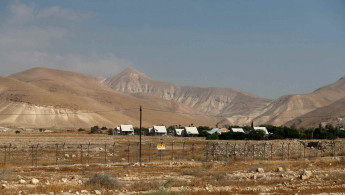Jordan says peace treaty with Israel could be 'at stake'
Jordan's house speaker said Wednesday a pledge by Israel's prime minister to annex a key part of the occupied West Bank if re-elected could put the peace treaty with Israel "at stake".
"The house of representatives, rejecting all the racist statements coming from the leadership of the occupier, confirms that dealing with this occupier requires a new path that would place the peace treaty at stake," Atef al-Tawarneh said in remarks carried by official news agency Petra.
He accused Israel of having "studiously broken all international treaties and (UN) resolutions".
On Tuesday, Israeli Prime Minister Benjamin Netanyahu vowed to extend Israeli sovereignty over the Jordan Valley and the northern Dead Sea which account for one third of the West Bank if re-elected next week.
Jordan and Israel have been bound by a peace treaty since 1994 but relations between the neighbours have been chronically tense.
The peace accord is just the second between an Arab country and the Jewish state, after Egypt in 1979.
Netanyahu's announcement sparked an outcry in Arab capitals.
Palestinian officials said it would "destroy" the entire peace process.
On Tuesday Jordanian Foreign Minister Ayman Safadi said the move would "push the whole region towards violence".
The EU warned Wednesday that Netanyahu's election pledge undermines chances for peace in the region, saying it would not recognise any change to Israel's borders that was not agreed by both sides.
In his televised speech, the prime minister also reiterated his intention to annex Israeli settlements in the wider West Bank if re-elected.
But he said he would do that in coordination with US President Donald Trump, whose long-awaited peace plan is expected to be unveiled sometime after the vote.
Those moves could effectively kill any remaining hopes for a two-state solution to the Israeli-Palestinian conflict, long the focus of international diplomacy.
In-depth: The 1967 Arab-Israeli War and the making of today's Middle East
The Jordan Valley was conquered by Israel during the war in 1967, and since then has mostly been under its military and administrative control.
Israel has always maintained that it cannot give it up for reasons of security.
According to human rights group B'Tselem, the northern Dead Sea and the Jordan valley "constitute almost 30 percent of the West Bank. Nearly 65,000 Palestinians and some 11,000 [Israeli] settlers live there".
Despite Israel's currently occupation of the region, a formal annexation would lead to Israel's complete control over the region, spelling disaster for the Palestinians that currently live there and would be a further major blow to the viability of a Palestinian state.
Follow us on Twitter: @The_NewArab





 Follow the Middle East's top stories in English at The New Arab on Google News
Follow the Middle East's top stories in English at The New Arab on Google News
![Israeli forces ordered bombed Gaza's Jabalia, ordering residents to leave [Getty]](/sites/default/files/styles/image_330x185/public/2176418030.jpeg?h=a5f2f23a&itok=_YGZaP1z)

